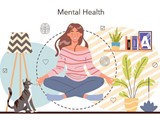15 Happiness Habits to Boost Your Mental Wellbeing

In the hustle and bustle of daily life, our mental wellbeing often takes a backseat. However, nurturing mental health is vital for a fulfilling and balanced life. Mental well-being encompasses our emotional, psychological, and social health, influencing our thoughts, feelings, and actions.
This blog explores habits that can significantly contribute to enhancing your mental well-being. By adopting simple yet powerful practices, you can create a positive impact on your overall mental health.
By integrating consistent physical activity and nutritious eating habits, practicing mindfulness, and nurturing social connections, these routines are tailored to blend into your daily schedule seamlessly. However, if individuals find that their well-being persists without improvement through physical or mental exercises, seeking guidance from healthcare professionals becomes important. Health practitioners will provide the following:
- Attentive care.
- Employing mental health billing services during treatment.
- Liaising with relevant insurance companies.
5 Physical Wellbeing Habits
Here we are providing a list of 5 major physical well-being habits to moderate your appearance and for your mental and physical care:
1. Regular Exercise
Engaging yourself in regular exercise is essential for maintaining physical well-being. You need only to aim for at least 30 minutes of moderate-intensity exercise most days of the week.
This can include activities like brisk walking, jogging, or cycling. Combining aerobic and strength exercises enhances cardiovascular health, supports weight management, and improves mood by releasing endorphins.
2. Healthy Eating
Prioritizing a balanced diet for sustaining good physical health is a necessity for well-being. You only need to include a variety of fruits, vegetables, lean proteins, and whole grains in your meals. Mindful eating is equally important; pay attention to your body's hunger and fullness cues rather than eating out of habit or emotional reasons.
3. Quality Sleep
Establishing a consistent sleep schedule is fundamental for physical well-being. Aim for seven to nine hours of quality sleep each night by going to bed and waking up at the same time daily. Create a relaxing bedtime routine, including reading or a warm bath, to signal to your body that it's time to wind down. Quality sleep is integral to physical recovery, immune function, and overall cognitive performance.
4. Hydration
Drink ample water throughout the day to support bodily functions, including digestion and temperature regulation. Limit the intake of sugary beverages and excessive caffeine, especially close to bedtime, to avoid disruptions in sleep patterns. Staying properly hydrated is essential for maintaining energy levels, cognitive function, and overall health.
5. Posture Awareness
Maintaining good posture is crucial for preventing musculoskeletal issues and promoting physical well-being. Whether sitting at a desk or standing, be mindful of your posture to avoid strain on the spine and muscles. Take breaks to stretch and move around, particularly if you have a sedentary job. Incorporating good posture habits into your daily life contributes to better physical health and reduces the risk of chronic pain or discomfort.
10 Mindfulness and Relaxation Techniques For Mental Wellbeing
Here are 10 relaxation techniques for your mental health and mindfulness exercises:
1. Meditation
Engage in regular meditation, dedicating a few minutes daily to clear your mind and focus. Experiment with techniques such as mindfulness meditation and concentrating on your breath to cultivate a sense of calm and presence.
2. Deep Breathing Exercises
Practice deep breathing exercises to manage stress and promote relaxation. Techniques like diaphragmatic breathing involve inhaling deeply through your nose, allowing your diaphragm to expand, and exhaling slowly through your mouth, helping to calm the nervous system.
3. Yoga
Incorporate yoga into your routine for both physical and mental well-being. Explore various yoga poses, including beginner-friendly ones like child's pose or downward-facing dog, to enhance flexibility, balance, and relaxation.
4. Progressive Muscle Relaxation (PMR)
Try Progressive Muscle Relaxation, a technique involving tensing and slowly releasing different muscle groups to promote relaxation. Starting from your toes and working up to your head helps release physical tension and stress.
5. Body Scan Meditation
Practice Body Scan Meditation, a technique involving focused attention on different body parts. Lie down or sit comfortably, bring awareness to each body part, and consciously release any tension, fostering a deep sense of relaxation.
6. Guided Imagery
Use Guided Imagery to create a calming mental experience. Close your eyes, listen to a guided script, and visualize serene landscapes or positive scenarios. This technique enhances relaxation and reduces anxiety.
7. Tai Chi
Explore the gentle movements of Tai Chi for mindfulness and relaxation. This ancient Chinese practice combines breath control with flowing, slow-motion postures, promoting balance and tranquility.
8. Mindful Walking
Incorporate Mindful Walking into your routine by paying attention to each step and your surroundings. This simple practice connects you with the present moment, fostering a sense of mindfulness and calm.
9. Aromatherapy
Utilize aromatherapy as a relaxation technique. Experiment with calming scents such as lavender or chamomile through essential oils, candles, or diffusers to create a soothing environment.
10. Listening to Relaxing Music
Engage in the therapeutic effects of music by listening to calming tunes. Choose instrumental or natural sounds to create a peaceful atmosphere, promoting relaxation and reducing stress.
Final Words - Your Mental Well-being Is Your First Step Towards Health
In fostering physical well-being, make a habit of regular exercise, healthy eating, and quality sleep. We recommend you prioritise mindfulness through meditation, deep breathing, and yoga. If you balance these with relaxation techniques like progressive muscle relaxation and body scan meditation, we guarantee you will feel the results of mindfulness progression. If you encounter ongoing challenges and seek professional support, practitioners may incorporate medical billing codes related to mental health in addressing your concerns.
